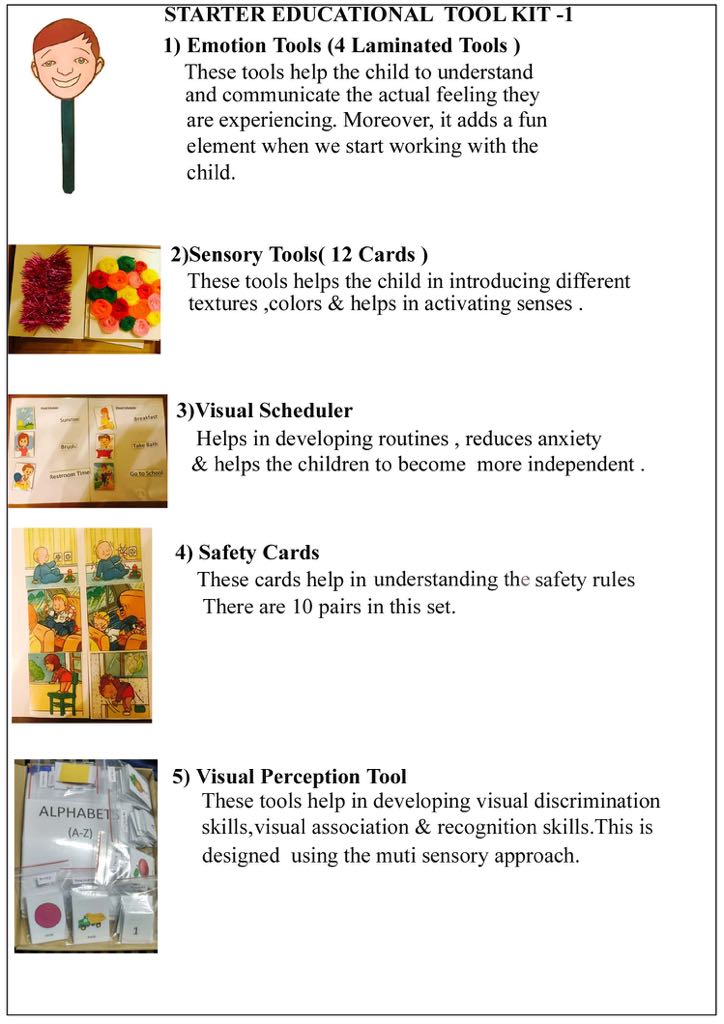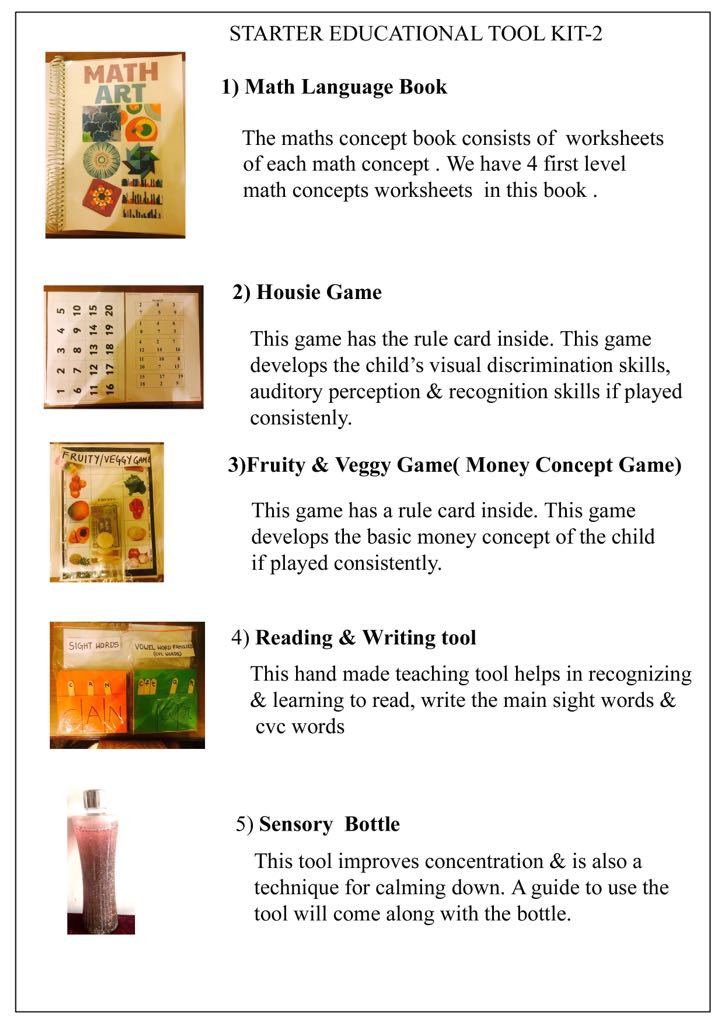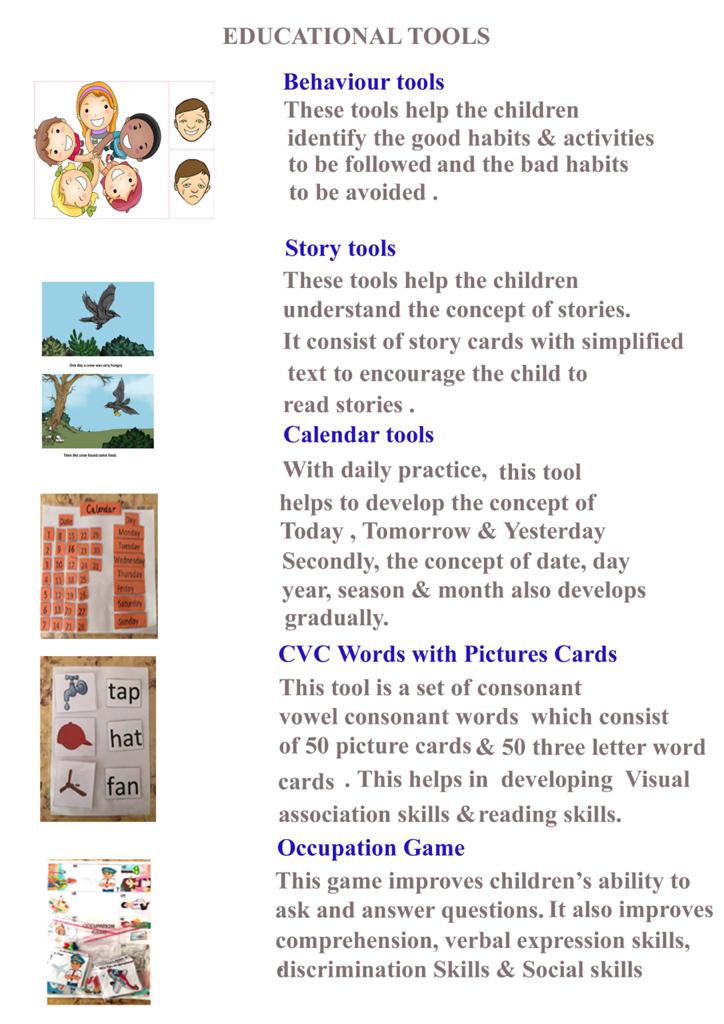GUIDELINES FOR TOOL USAGE:
1. Behavior tool: Children with special needs are generally unaware about what is a right or wrong behavior unless they are given clear guidelines. Therefore this behavior tool which consists of 20 cards includes good habits, good activities and bad habits in form of visuals which will help the children to identify the good behavior to be followed or the bad behavior to be avoided.
2. Story Tools: Generally the story books available are elaborate in terms of number of pictures and amount of text This makes it complicated and difficult for our children to understand the concept of story or to recollect it in a sequence especially, when they are new to the concept of story. Therefore, this story tool which consists of 5 different story cards, simplified text and limited pictures helps the children to understand the concept of story faster. This tool is created to encourage children to read stories.
3. Calendar Tools: These tools help in understanding the concept of today tomorrow and yesterday .It will also help the children in understanding the concept of day date month year and season gradually .A picture of the guideline about the placement of the tool is also given along with the tool. We recommend one concept is taught at a time to the child and only when he/she is thorough should we teach the next.
4. CVC Tools: These are Consonant vowel consonant tools which consist of the most common 50 words along with the pictures of the words. This tool will help in teaching visual association skills and reading skills .As all our children are visual learners these tools help them read along with association of the words with the relevant pictures.
5.Occupation Game : This tool improves the ability to ask and answer questions . This also develops comprehension & verbal expression skills as it is a very interactive game .Moreover, it improves the reading skills .The child learns about 6 different occupations. He also develops visual discrimination skills & social skills.
This kit has been developed as a basic starter kit designed to develop perception and processing skills in kids. It has been designed to provide inputs using different senses in the body which will not only help kids learn new concepts faster but will also help retain them longer. Kids learn faster when presented with visual stimulus so every effort has been made to give them a lot of visual content.
1. Emotion Tools : Children with special needs, often have trouble recognizing emotions both in themselves and others. These tools, which are in the form of cards, can be put to use to teach children recognize and understand different emotions. First step would be to teach the children the different emotions each card represents. Once they start recognizing different emotions; the next step would be to teach them to recognize these emotions in themselves. When asked a question on how they are feeling, they can be taught to point to the correct emotion card based on their feeling at that time. They can also be taught to recognize each emotion and answer questions on the reasons for the emotions. These cards can be also put to use to recognize the same feelings in others and help increase their social interactions with others.
2. Visual Perception tool : This tool lays the foundation to initiate the children towards academic development such as alphabets, numbers, colors, shapes and fruits recognition and matching. It is a highly effective teaching tool as it incorporates and utilizes different senses to provide visual, auditory and tactile stimulation to promote learning in children. It can also be used to match cards with the objects (actual ones or ones in puzzles) to develop picture object matching concept.
3. Visual Scheduler : These children often experience anxiety as they lack understanding on what is going to happen next. This tool can be used to provide clarity about their daily routine and inculcate a sense of calm regarding their daily routine. They are better prepared if they know what they are expected to do next. This tool can be used to first show them the list of activities that they are expected to do in different parts of the day. Once the activity is done, they should be encouraged to place the card in the appropriate place. This would also ensure a sense of completion of the task. The next level would be to match the picture to the written text which would also help with word recognition and pave their way to future reading.
4. Sensory Tools : These children often are sensory seekers. Exposing them to different stimuli would ensure sensory satisfaction. This sensory tool would provide them with different tactile, visual and auditory experiences, soothing and calming them during panic attacks and also would act as a re-enforcer. These tools can be used to also teach them variances in different textures.
5. Safety Cards : These children are strong visual learners. Many of them lack a sense of safety. These cards provide the essential visual cues to teach them safety rules. These can be used as two sentence social story giving importance to safety issues and also to flash them as a visual cue to stop a child from doing something dangerous. Researches have proved that visual clues help children understand a concept faster than verbal prompts.
6. Reading and writing tool : This tool can be used as a fun way to teach children the basics of reading and formation of spellings. The tool used 3D objects to teach a concept to make it more effective than simply making them read out of a book or making them write. This tool has word families to teach basic reading. It can also be used to teach the concept of rhyming words. Such exercises provide visual as well as auditory discrimination skills when words are formed and read aloud. They also promote further learning by providing tactile/kinesthetic sensations
7. Fruity/Veggie game : It is important for these children to understand the concept of money. This game uses daily activities such as buying vegetables and fruits to introduce the concept of money. It can be played at two levels. The younger children can just count the money and pay for the fruits and vegetables. The older children can be taught to add different denominations of the money to arrive at the final price of the fruit or vegetable being bought. This is a fun way to teach the concept and also would help in developing daily living skills. This game can also be played in groups to help build socialization skills. Rule card is available with instructions to play the game.
8. Housie Game : This game lays the foundation to reading skills by gradually introducing all the tools essential for reading. Starting with alphabet recognition to CVC (Consonant, Vowel, Consonant like pat, bat, hat etc) words and finally arriving at the Dolch word list. This is a fun way to teach the children as they are more willing to learn in a play method than the usual schooling way. Research shows that concepts learnt through play are much likely to stay with the children in the long run than through books and schooling. This game, too, can be played in groups to help build socialization skills. A rule card is available with instructions to play the game.
9. Sensory Bottle : These children often grow anxious when thrown into new situations. This sensory bottle gives them the necessary distraction from their current situation to ease their anxiety and also give visual stimulation to sensory seekers. It is great tool to carry in your bag and provides the children a calming effect either in a social situation or a crowded mall where their senses are likely to be overwhelmed resulting in them throwing tantrum or face meltdown. Many Occupational therapists use & suggest this bottle and it has shown to give quite positive results.
10. Math Language Book : Math basically consists of concepts and calculations. So Math is taught to these children, it is essential that they know concepts like big/small, far/ near etc. This would help these children to learn additional Math concepts in future. We have put in worksheets that range from being simple to being complex to help them learn these concepts. This would provide with a great start to your child’s future mathematical education.
Note: It is advised to always use the tool under parental supervision. It is also advised that the tools are fragile and reasonable care needs to be exercised while using it. “Team Perception” bears no responsibility for any damage caused during the usage and it would fall under usual wear and tear. CONTACT MS. TEJAL SHAH AT 9886000154 FOR FURTHER INFORMATION.
Highlights
- 2020 (19)
- Achievements (28)
- amazing advocates (25)
- Celebrations 2022 (2)
- Daily living activities (29)
- Down Syndrome Day Celebrations (2)
- Education (5)
- Events (12)
- Health Camp (12)
- Important Information (19)
- Inspiration (43)
- Jyotisho Yoddhas (31)
- Khul Jaa Sim Sim Mantra (31)
- Magic Mantras (60)
- Online Session (2)
- Recent Events (8)
- Rekha Maa's Desk (2)
- Stars (32)
- Support for Surgery (2)
- WDSD (2)
- wdsd23 (1)



